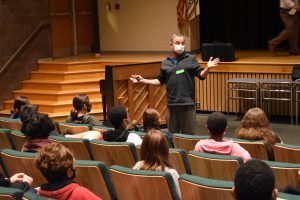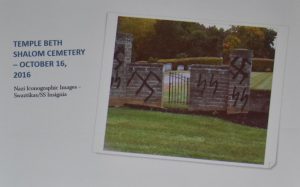
A recent eighth-grade assembly, called “Hate is Not Welcome Here,” blended important character-building education with upcoming social studies content.
“’Hate’ is not welcome here,” Principal Michael Larsen told students as an introduction to the program. “That includes words, symbols and actions. Today’s important message ties into what we stress here every day: Kindness is important and kindness counts. In the near future, in your social studies classes, you’ll be studying immigration. Part of that includes learning how people were unjustly mistreated, and how bias, prejudice and hate were a part of that.”
He added: “Today’s discussion focuses on an anti-Semitism incident that happened at local cemetery because of hatred. It’s hard to hear, and you’ll be hearing more about this on a global level as your social studies lessons progress.”
Temple Beth Shalom cemetery desecration
Michael Melasky, Temple Beth Shalom cemetery committee co-chair, spoke to students about an anti-Semitic incident at the Florida cemetery five years ago, two days after Yom Kippur, the holiest of days in the Jewish calendar. The  cemetery entrance walls were desecrated by spray painted black swastikas and SS bolts.
cemetery entrance walls were desecrated by spray painted black swastikas and SS bolts.
“A cemetery is a place of peace and resolution,” Mr. Melasky, a retired educator, told students. “Now, the worst level of imagery was there.”
He spoke about how cemetery officials addressed the issue and how the inappropriate symbols affected the temple’s congregation and the greater community.
“This cemetery has people buried in it who survived the Holocaust,” he said. “This impacted so many people in so many ways, not just those who are Jewish, or have family members who survived the Holocaust, but people of all faiths. Our temple was supported by so many. We had an ecumenical service of support and healing from people representing all faiths from all over Orange County.”
Zero tolerance
Mr. Melasky used the cemetery’s desecration as a springboard to discuss other symbols of hate: Nooses, swastikas and burning crosses…symbols still existing in society.
“You have to be aware of and deal with this issue of hate,” he stressed. “Everyone knows people who look at others with disdain and hatred. Why? They may be expressing anger, feelings of superiority, or showing off. It’s becoming a culture in our society and it’s unacceptable. Years ago, this was more tolerated, but things have changed dramatically in our society. You’re finding society and schools have zero tolerance for this now, and that’s a very good thing.”
Importance of DASA
Mr. Melasky reminded students that New York State’s Dignity for All Students Act (DASA) was enacted to protect students from being bullied, discriminated against, intimidated, taunted or harassed. At Minisink Valley, all students are reoriented to the significance of DASA at the beginning of the school year as well as throughout the year.
“Our society takes these issues very seriously,” said Mr. Melasky. “It’s not a joke to hate someone, to bully someone.”
Takeaways to remember
As a reminder, he stressed important takeaways to students, acknowledging it’s hard to be a young adult in a society still filled with language and symbols of hate.
“If you allow it to happen in front of you, you allow it to continue,” he said. “Confront the language. Confront the behavior. Be an advocate for change. Silence is not an option.”
He encouraged students to give thought to a quote by author Maya Angelou: “Hate has caused a lot of problems in this world, but has not solved one yet.”
And, as for the desecrated cemetery walls?
“We rebuilt them,” said Mr. Melasky. “We won’t let someone hate us. We’re showing fortitude, and incorporating love into all we do. That’s what the new walls represent now.”
